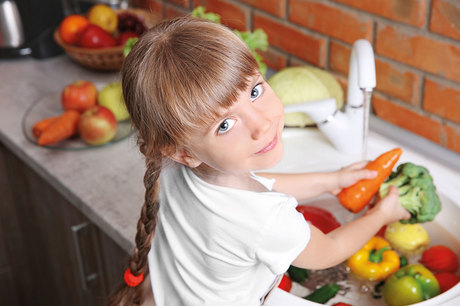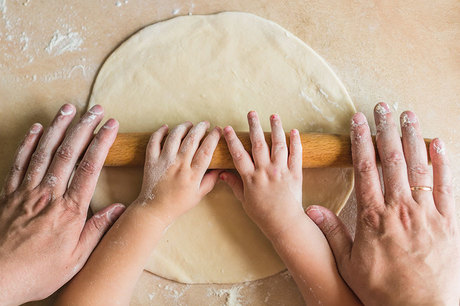
For generations, young children have enjoyed cooking and baking in the home. It is how secret family recipes are passed from one generation to another. It is also a wonderful way for children to learn about food, and learn a range of other skills that will support their development.
FIVE THINGS YOU NEED TO KNOW
1. Time for sharing
With many parents working and leading busy lives, cooking alongside their child is a great way to catch up and simply spend time together. Cooking as an activity is special. It is a time that is likely to be free from the distraction of mobile phones and tablets and so can be a fantastic opportunity to enjoy being together. Cooking together is a positive way in which your child can gain your attention and develop feelings of togetherness. This is particularly important if you spend many hours apart from your child.
2. Building physical skills
There are a range of physical skills mainly involving the hands that can be developed through cooking. Not only are these skills important for life, they are also important in developing handwriting. Through washing and drying items such as dishes, fruit and vegetables, children’s hand preference can be strengthened. Mashing, stirring and pounding also build physical strength in the hands. Other activities such as grating and cutting can help your child develop hand-eye co-ordination.

3. Developing tastes
If your child is a bit of a fussy eater, you may find that involving them in food preparation will pay dividends. Many children, who refuse to eat certain food at the table, take a very different view when they have been directly responsible in some way for it. Consider involving your child in decisions about which vegetables to cook when you are out shopping, and during the cooking process encourage your child to taste at different intervals.
4. Developing confidence and perseverance
From an early age, children need to develop feelings of competency. Being able to cook alongside an adult can give a child the feeling that they are seen as competent and so can build an inner confidence. Cooking also involves some patience, and sometimes things do not turn out as expected. This means that through cooking, your child can develop the important life skill of perseverance.
5. Developing mathematics
There is a huge amount of early mathematics in cooking. Children can learn about measuring through weighing out ingredients, as well as size, as they choose the right size of saucepan or serving dish. There are also many opportunities for counting, as you may count out the number of fruit or vegetables needed for preparation or the number of plates and bowls that are needed to lay the table.
HOW TO MAKE THE MOST OF COOKING TIME
Expect to go slower…
If your child does not normally join you in the kitchen, expect that things will take longer than usual. One of the first tasks that children can often help with is to bring you things that you need. But do expect that if you ask for a tablespoon, your child might bring you over a teaspoon or a ladle. As with all skills, children need time in order to understand what they need to do, and they will need you to be patient. The good news is that the more that children come alongside you, the more skills they will develop.

Play is part of learning
While you may be focused on cooking, young children will often want to turn some aspects of cooking into play. They may enjoy turning the tap on and off as they wash vegetables or see which ones will make the biggest splash. You may also find that your child at times will want to play with saucepans, spoons and see what tools can do. This is all normal and part of the cooking experience with young children.
Small steps
One of the skills of being a parent is to recognise what your child can do and what things they may need support with. When cooking with your child, try to think what they are ready to have a go at and also what new skills they may need help with. Children do not learn to cook overnight, but instead need adults to help them take small steps. In terms of food preparation, think about activities that involve washing, tearing and drying to start with. Then think about encouraging your child to stir and mash. Later on, see how your child gets on with grating, and then when your child is ready, show them how to use a knife to cut soft but firm food such as a banana.
Making a meal out of it…
From time to time, think about making cooking into an occasion. Perhaps you can invite friends or family over or create a special dinner or lunch. With your child, you can write a shopping list, menu and decorate the table. You could look at a recipe book and talk about what food to cook. While creating a big occasion may only occur once in a while, you will find that the confidence and skills that your child gains will be worth it. It is a wonderful thing to do on a wet day when everyone is at a loose end.
Safety
Finally, it is important that you are vigilant when you cook, but also about what you leave out when you are not in the kitchen. Young children like to copy adults, and so if they have seen gadgets such as liquidisers being used or knobs being turned on a cooker, they may try to have a go themselves. Make sure that you impress upon your child that some things are for adults only, but remember also to put things away so your child cannot be tempted.









